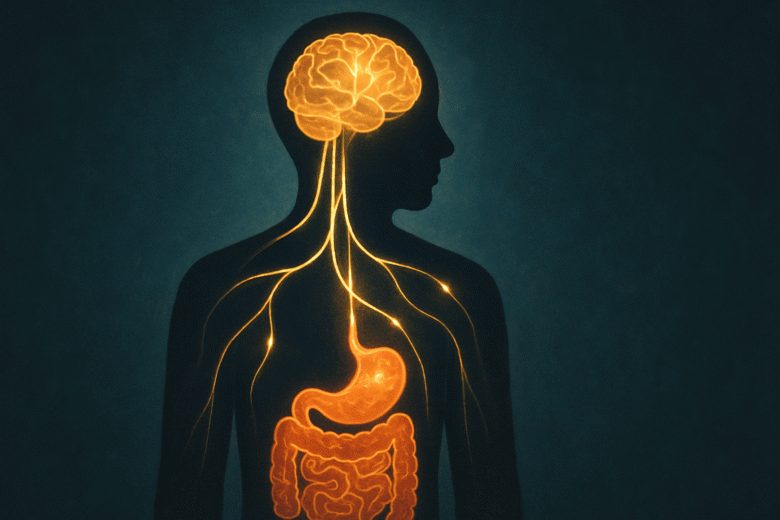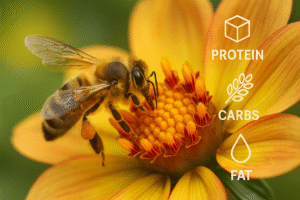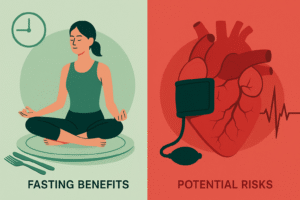Fun Fact: Your gut has over 100 million neurons—more than in your spinal cord—and can function independently of your brain.
You’ve heard the phrase “gut feeling.” But what if that flutter before a big decision, that anxiety when you’re nervous, or even your everyday mood swings weren’t just in your head—but in your stomach?
This isn’t pseudoscience or poetic metaphor. It’s neuroscience. Your gut is wired with its own nervous system—so powerful and complex that scientists have started calling it your “second brain.” And it’s talking to your real brain more than you might think.
In this blog, we dive into the strange, messy, and surprisingly emotional relationship between your gut and your mind—and why healing your brain might start with feeding your belly.
The Enteric Nervous System: Your Gut’s Neural Superhighway
At the heart of this idea is the Enteric Nervous System (ENS)—a vast network of neurons embedded in the walls of your gastrointestinal tract. The ENS controls digestion, yes—but it also senses environmental changes, manages immune responses, and communicates with your central nervous system (CNS).
That communication happens through the gut-brain axis, a two-way biochemical highway connecting your gut and your brain via:
- The vagus nerve (your body’s main information superhighway)
- The immune system
- Hormones like serotonin and dopamine
- And the gut’s unsung heroes: microbes
The Microbiome: Your Gut’s Hidden Community
Inside your digestive system live trillions of bacteria, viruses, and fungi—collectively known as the gut microbiome. Far from being passive passengers, these microbes:
- Produce neurotransmitters
- Help regulate inflammation
- Influence metabolism
- Shape your mood and even your thoughts
In fact, over 90% of the body’s serotonin—a neurotransmitter that regulates mood, appetite, and sleep—is produced in the gut, not the brain.
This means that what’s happening in your intestines can seriously impact your mental health.
Case Study: Depression and the Gut
Researchers have noticed something strange for years: people with depression often have chronic digestive issues. Could the gut be contributing?
A 2019 study published in Nature Microbiology found that people with depression had significantly different gut microbiota compared to those without. Certain bacteria—like Coprococcus and Faecalibacterium, associated with well-being—were missing.
When scientists transplanted gut bacteria from depressed individuals into mice, the mice began showing signs of depression too—like reduced interest in food and movement.
It was a breakthrough: depression may begin in the gut.
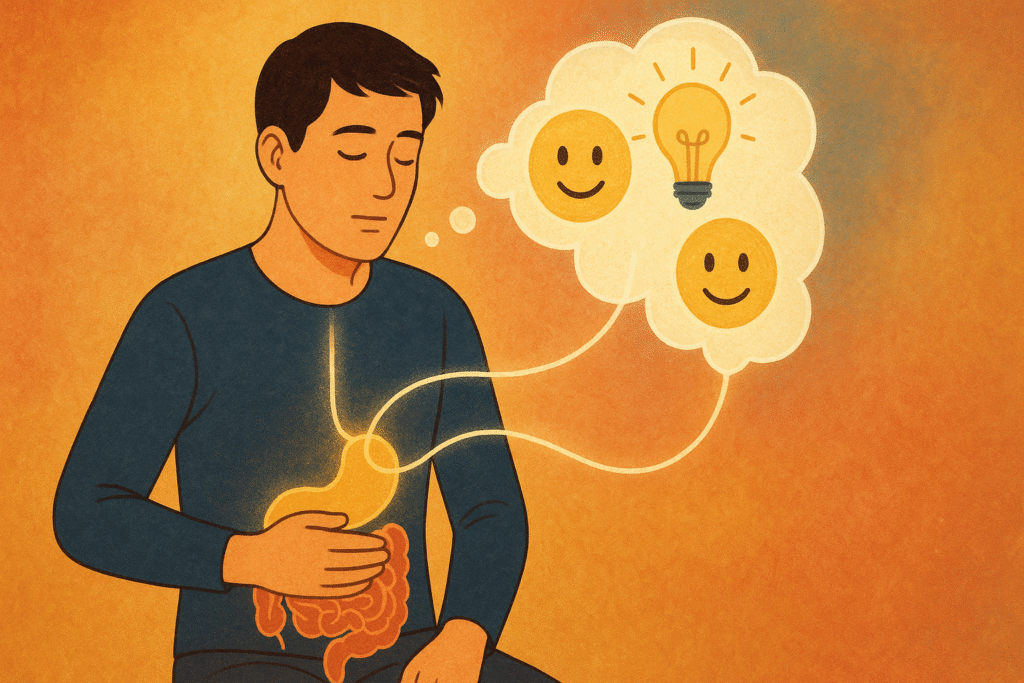
Your Gut Talks—and Your Brain Listens
Here’s what your “second brain” might be saying:
“I’m inflamed” → You feel anxious, foggy, or irritable
“I’m starving” → Your brain misreads hunger as a low mood
“I’m happy” → Your brain mirrors those signals and boosts energy
“I’m out of balance” → Your mental health may spiral slowly
And unlike your head brain, your gut doesn’t lie. It reacts to stress, poor diet, antibiotics, and even loneliness. It holds your secrets—and sometimes, your sadness.
The Gut and Anxiety: Butterflies or Alarm Bells?
You’ve probably felt anxiety in your belly: a twisting knot, a heavy pit, or those unmistakable butterflies before a public speech.
That’s not imagination—it’s physiology.
The vagus nerve, which runs from your brainstem to your abdomen, plays a key role in regulating this response. When your brain senses danger, your gut tenses. But the gut can also send danger signals upward, triggering anxiety or panic.
Chronic gut inflammation, for instance, has been linked to higher levels of cortisol (a stress hormone) and an overactive fight-or-flight response.
Food as Mood: What You Eat Affects How You Feel
What we eat doesn’t just feed our bodies—it feeds our microbiome, which then affects our brains.
Gut-Friendly Foods:
Probiotics (yogurt, kefir, fermented foods): help balance gut bacteria
Prebiotics (onions, garlic, bananas): feed good microbes
Omega-3s (flaxseeds, walnuts, fatty fish): reduce inflammation
Polyphenols (berries, dark chocolate, green tea): promote brain health
Gut-Offending Foods:
Ultra-processed snacks: disrupt microbial balance
Refined sugars: fuel inflammation
Alcohol & antibiotics (when overused): kill good bacteria
It’s not about dieting—it’s about nourishing the system that nourishes you.
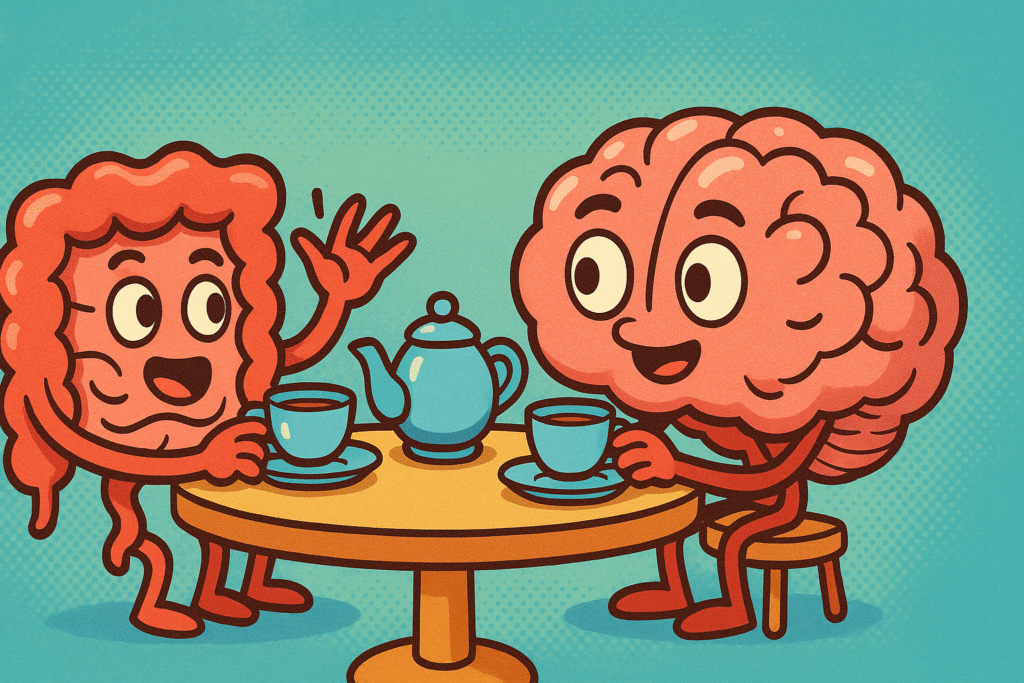
Your Gut and the Immune System: Inflammation and Mood
The gut is home to 70% of your immune system. When things go wrong—leaky gut, dysbiosis (imbalance in gut microbes), chronic stress—your immune system responds by triggering inflammation.
And guess what? Inflammation has been directly linked to:
- Fatigue
- Brain fog
- Depression
- Anxiety
- Cognitive decline
It’s why anti-inflammatory diets, probiotics, and even fecal transplants (yes, really) are being explored as treatments for neurological conditions.
What Companies Are Doing: Gut-Brain Tech on the Rise
Startups and biotech firms are paying attention.
BiomeSense (a Chicago-based company building continuous microbiome monitoring systems) and Seed Health (a microbial sciences company designing next-gen probiotics) are developing tech that could one day let you track your mental health through your poop.
Yes—soon, your toilet may give better therapy advice than your smartphone.
Even major pharmaceutical companies are investing in psychobiotics—a new class of bacteria-based treatments aimed at improving mood, cognition, and emotional resilience.
The Ancient Wisdom That Science Just Caught Up To
Ayurveda, and other ancient healing traditions have long emphasized the gut as a core pillar of overall health—including mental and emotional well-being.
Now, neuroscience and microbiology are catching up. What used to sound like woo-woo is becoming lab-verified fact.
Conclusion: Listen to Your Gut—Literally
Your gut isn’t just digesting food. It’s interpreting your environment. It’s regulating your hormones. It’s shaping your thoughts.
Maybe that “gut instinct” is more than a feeling—it’s a signal from your body’s second brain. One that sees patterns, senses safety, and remembers trauma.
So the next time you’re low, ask yourself: What did I eat? How’s my digestion? Am I feeding my brain—or just my cravings?
Because healing your mind might start with trusting your gut.
Author’s Note
This blog is an invitation to see your gut not as a passive system but as a lively, thinking, talking organ. A second brain that deserves attention, kindness, and good food. After all, mental clarity might begin in the belly.
G.C., Ecosociosphere contributor.
References and Further Reading
- https://www.ncbi.nlm.nih.gov/pmc/articles/PMC5862759/
- https://www.apa.org/monitor/2012/09/gut-feeling
- 5 Things You May Not Know About the Gut-Brain Connection. https://account.opositiv.com/blogs/blog/5-things-you-may-not-know-about-the-gut-brain-connection
- The Positive Effects of Cleaning on Your Mental Health – The Simple Scrub. https://thesimplescrub.com/home/the-positive-effects-of-cleaning-on-your-mental-health/

